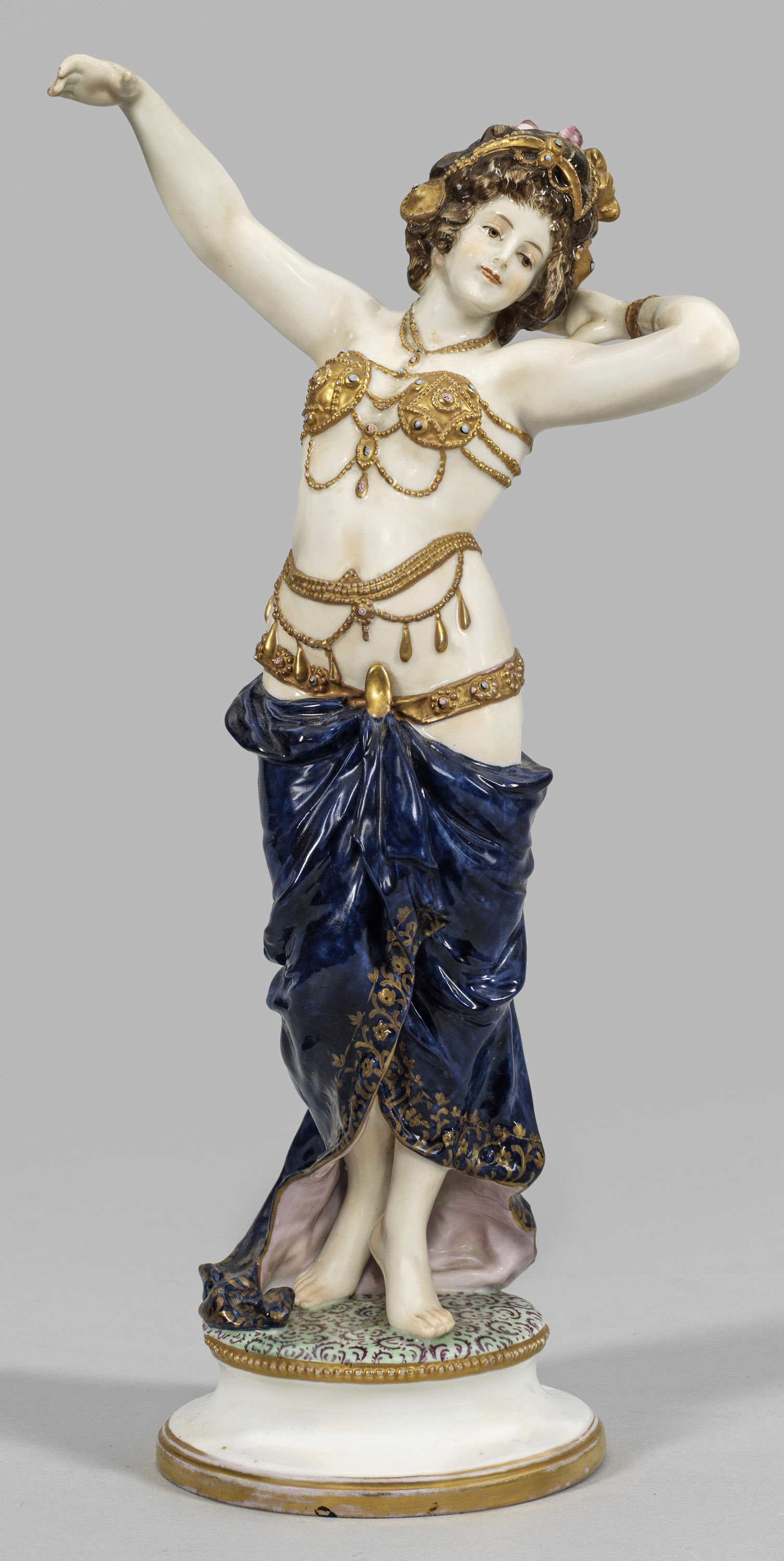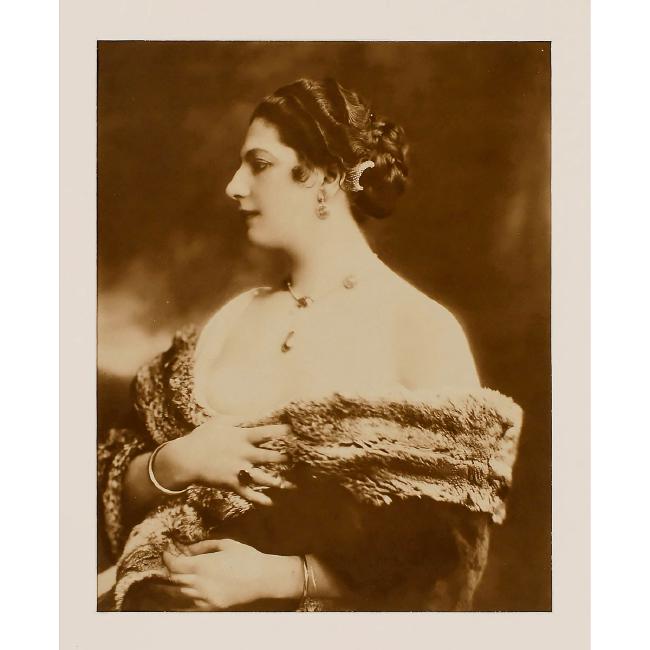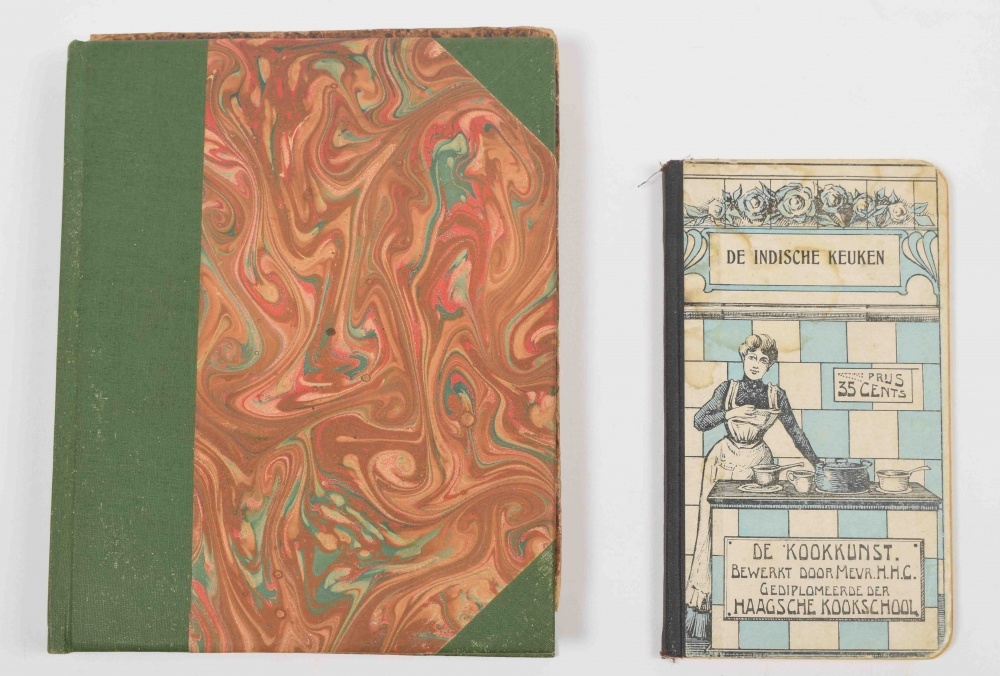MATA HARI [Margaretha Geertruida Zelle] (1876-1917), French Spy , (1876-1917). Four autograph letters signed ("Mata Hari" or "Marguerite"), one also signed in text, to Jean Hallaure and unidentified [Baron de Marguérie?], 2 August 1916 and n.d. Together 12 pages, 8vo and 4to, three letters on Grand Hotel of Paris stationery. Small filing holes, one letter browned and beginning to separate (repairable) .
MATA HARI [Margaretha Geertruida Zelle] (1876-1917), French Spy , (1876-1917). Four autograph letters signed ("Mata Hari" or "Marguerite"), one also signed in text, to Jean Hallaure and unidentified [Baron de Marguérie?], 2 August 1916 and n.d. Together 12 pages, 8vo and 4to, three letters on Grand Hotel of Paris stationery. Small filing holes, one letter browned and beginning to separate (repairable) . "HE KNOWS EVERYTHING ABOUT MY WHOLE EXISTENCE..." MATA HARI'S ILL-FATED JOURNEY TO THE WAR ZONE TO SEE HER RUSSIAN LOVER Eager to get into the war zone to see her gassed and wounded young lover, Vadim Masloff, the famous courtesan and French spy struggles to obtain official permission to enter the restricted area of Vittel. She turns to two former lovers, Jean Hallaure, a French intelligence officer, and Baron de Marguérie, a French diplomat. In the first of two pneumatic letters to Hallaure on 2 August, she says: "I would be delighted if you would be good enough to introduce me to the doctor whom I will ask to certify me [as needing Vittel mineral waters] to support my request for the sojourn to Vittel. I need it..." In a second, sent later in the evening of 2 August, she starts to explain the problems she encountered when trying to register with the police: "It is perhaps the gendarme who took only a quarter of my name..." But she decides to write a longer account on standard-sized stationery (the small, blue pneumatiques , which Parisians called petit bleus , were used only for short communications). She explains to Hallaure how her recent divorce and name change have complicated her official identity: "I sent you a pneumatique but it is too short to explain this well. Voila. Since the divorce was pronounced, my maiden name goes in front and MacLeod [her married name] after. And then the Prefecture had written below 'known as Mata Hari.' All that was perhaps a bit of algebra [i.e., confusing] for the gendarme who must certainly have written only my maiden name....Since I decided I was not in friendly surrounding, I left and that was that..." The fourth letter, dated only "Saturday" was likely sent in early September 1916. The recipient is also unnamed although it may have been the diplomat Henry de Marguérie, to whom she had also turned for help at this time: "My request has been approved by the Commissioner of Police and [has] probably arrived at the military authority. I went there again today, but there is a different lieutenant every day....So I will go there again on Monday to ask that they activate a bit the decision. I am so tired and disgusted with all these démarches in the [police] office that I really don't know what to say. If they need references about me to go more quickly, I'll ask Maitre Clunet...to supply them. He has known me for ten years and has had my marriage and divorce certificates in his hands. He knows everything about my whole existence. Could that do something?" Another former lover, Clunet would serve as her lawyer during her trial for treason. In 1894, 18-year old Margeurite Zelle traveled to Paris where she found work as the traveling companion to a middle-aged Dutch army officer, Rudolf MacLeod, who became her first husband. She traveled with MacLeod to the Dutch East Indies, where she became fascinated with the sensual and exotic native dances. When the marriage ended in divorce, she relocated to Paris and re-invented herself as the Indian-Javan priestess, Mata Hari ("Eyes of the Dawn" in the Malayalam language). She also embarked on a career as the most famous and expensive courtesan in Europe. During the war she met and fell in love with Russian army captain Vadim Masloff. It is unclear, given still-sealed French records, exactly when Mata Hari began spying for the French, but she seemed eager to gain enough money from espionage to retire with Vadim. She told French officials she would ingratiate herself with German officers by pretending to be a double-agent in the service of Berlin. B
MATA HARI [Margaretha Geertruida Zelle] (1876-1917), French Spy , (1876-1917). Four autograph letters signed ("Mata Hari" or "Marguerite"), one also signed in text, to Jean Hallaure and unidentified [Baron de Marguérie?], 2 August 1916 and n.d. Together 12 pages, 8vo and 4to, three letters on Grand Hotel of Paris stationery. Small filing holes, one letter browned and beginning to separate (repairable) .
MATA HARI [Margaretha Geertruida Zelle] (1876-1917), French Spy , (1876-1917). Four autograph letters signed ("Mata Hari" or "Marguerite"), one also signed in text, to Jean Hallaure and unidentified [Baron de Marguérie?], 2 August 1916 and n.d. Together 12 pages, 8vo and 4to, three letters on Grand Hotel of Paris stationery. Small filing holes, one letter browned and beginning to separate (repairable) . "HE KNOWS EVERYTHING ABOUT MY WHOLE EXISTENCE..." MATA HARI'S ILL-FATED JOURNEY TO THE WAR ZONE TO SEE HER RUSSIAN LOVER Eager to get into the war zone to see her gassed and wounded young lover, Vadim Masloff, the famous courtesan and French spy struggles to obtain official permission to enter the restricted area of Vittel. She turns to two former lovers, Jean Hallaure, a French intelligence officer, and Baron de Marguérie, a French diplomat. In the first of two pneumatic letters to Hallaure on 2 August, she says: "I would be delighted if you would be good enough to introduce me to the doctor whom I will ask to certify me [as needing Vittel mineral waters] to support my request for the sojourn to Vittel. I need it..." In a second, sent later in the evening of 2 August, she starts to explain the problems she encountered when trying to register with the police: "It is perhaps the gendarme who took only a quarter of my name..." But she decides to write a longer account on standard-sized stationery (the small, blue pneumatiques , which Parisians called petit bleus , were used only for short communications). She explains to Hallaure how her recent divorce and name change have complicated her official identity: "I sent you a pneumatique but it is too short to explain this well. Voila. Since the divorce was pronounced, my maiden name goes in front and MacLeod [her married name] after. And then the Prefecture had written below 'known as Mata Hari.' All that was perhaps a bit of algebra [i.e., confusing] for the gendarme who must certainly have written only my maiden name....Since I decided I was not in friendly surrounding, I left and that was that..." The fourth letter, dated only "Saturday" was likely sent in early September 1916. The recipient is also unnamed although it may have been the diplomat Henry de Marguérie, to whom she had also turned for help at this time: "My request has been approved by the Commissioner of Police and [has] probably arrived at the military authority. I went there again today, but there is a different lieutenant every day....So I will go there again on Monday to ask that they activate a bit the decision. I am so tired and disgusted with all these démarches in the [police] office that I really don't know what to say. If they need references about me to go more quickly, I'll ask Maitre Clunet...to supply them. He has known me for ten years and has had my marriage and divorce certificates in his hands. He knows everything about my whole existence. Could that do something?" Another former lover, Clunet would serve as her lawyer during her trial for treason. In 1894, 18-year old Margeurite Zelle traveled to Paris where she found work as the traveling companion to a middle-aged Dutch army officer, Rudolf MacLeod, who became her first husband. She traveled with MacLeod to the Dutch East Indies, where she became fascinated with the sensual and exotic native dances. When the marriage ended in divorce, she relocated to Paris and re-invented herself as the Indian-Javan priestess, Mata Hari ("Eyes of the Dawn" in the Malayalam language). She also embarked on a career as the most famous and expensive courtesan in Europe. During the war she met and fell in love with Russian army captain Vadim Masloff. It is unclear, given still-sealed French records, exactly when Mata Hari began spying for the French, but she seemed eager to gain enough money from espionage to retire with Vadim. She told French officials she would ingratiate herself with German officers by pretending to be a double-agent in the service of Berlin. B










Try LotSearch and its premium features for 7 days - without any costs!
Be notified automatically about new items in upcoming auctions.
Create an alert